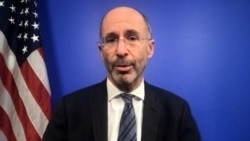Nuclear Talks
- By AFP
Blinken Says No Nuclear Deal On Table With Iran
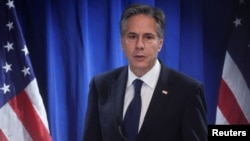
U.S. Secretary of State Antony Blinken says no new nuclear agreement is on the table with Iran, despite quiet new diplomacy between Washington and Tehran. "There is no agreement in the offing, even as we continue to be willing to explore diplomatic paths," Blinken said on June 28 in New York. "We'll see by their actions," Blinken said of the future relationship, calling on Iran "not to take actions that further escalate tensions" with the United States and in the Middle East. To read the original story by AFP, click here.
- By AP
Netanyahu Says He's Opposed To Any Interim U.S.-Iran Deal On Nuclear Program

Israeli Prime Minister Benjamin Netanyahu said on June 18 that he opposes any interim agreement reportedly being negotiated between the United States and Iran over its nuclear program.
Netanyahu spoke after reports in Israeli media said understandings are being reached between Washington and Tehran that would seek to hold back Iran’s nuclear program somewhat, in exchange for some sanctions relief.
The reports could not be independently confirmed, and the United States has publicly denied any such deal.
Netanyahu said Israel had informed the United States that “the most limited understandings, what are termed ‘mini-agreements’, do not – in our view – serve the goal and we are opposed to them as well.”
On June 17, a senior Israeli lawmaker said Israel could find acceptable an understanding between Iran and the United States if it includes rigorous supervision of Tehran's nuclear program.
"It's not a wide-scope agreement. It's more like a small agreement, a memorandum of understanding…and I think Israel can live with this if there is real supervision," said Yuli Edelstein, head of the Israeli parliament's Foreign Affairs and Defense Committee.
- By Reuters
Iranian Supreme Leader Says 'Nothing Wrong' With A Nuclear Deal With West
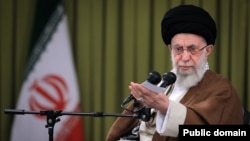
Iran's supreme leader said on June 11 that a deal with the West over Tehran's nuclear work was possible if the country's atomic infrastructure remained intact, amid a stalemate between Tehran and Washington to revive a 2015 nuclear pact. Months of indirect talks between Tehran and Washington to salvage the nuclear accord with six major powers have stalled since September, with each side accusing the other of making unreasonable demands. Ayatollah Ali Khamenei's guarded approval comes days after both Tehran and Washington denied a report that they were nearing an interim deal. To read the original story by Reuters, click here.
- By Reuters
Iran's Concessions To IAEA Largely Hinge On Future Talks, Grossi Says
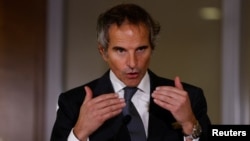
Iran's concessions to UN nuclear watchdog chief Rafael Grossi during his visit to Tehran depend largely on future negotiations, Grossi conceded, walking back some earlier comments. The International Atomic Energy Agency (IAEA) and Iran said they had agreed to make progress on various issues, including a long-stalled IAEA inquiry into uranium particles found at three undeclared sites in Iran. Grossi told reporters on March 4 they had agreed to reinstall all extra monitoring equipment but said on March 6 that "we will have to discuss...this, how do we do it," conceding this and other issues would hinge on future technical talks. To read the original story by Reuters, click here.
- By Reuters
China Says Full, Effective Compliance Is The Right Way Forward For Iran Nuclear Issue
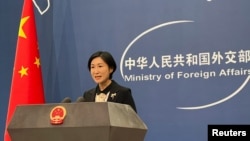
China believes that full and effective compliance is the right way forward for the Iranian nuclear issue, the Chinese Foreign Ministry said at a regular news briefing on March 6. "The U.S. should make a political decision as soon as possible to work for outcomes from the talks," said spokesperson Mao Ning when answering a question on the International Atomic Energy Agency (IAEA) and Iran issuing a joint statement on nuclear cooperation.
- By RFE/RL
Iran Promises To Cooperate With UN Nuclear Watchdog, Joint Statement Says After Grossi Visit
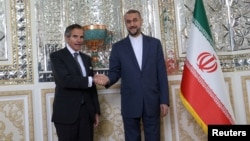
Iran has vowed to cooperate with the UN's nuclear watchdog to resolve outstanding issues after inspections reportedly showed that Tehran had enriched uranium to near nuclear-weapons grade, a joint statement from both sides said.
"Iran expressed its readiness to...provide further information and access to address the outstanding safeguards issues," a joint statement by the Iranian government and the International Atomic Energy Agency (IAEA) said on March 4.
IAEA chief Rafael Grossi, speaking to reporters in Vienna following a two-day visit to Tehran, said the new agreement includes the reinstallation of monitoring equipment and would allow access to experts for an investigation into uranium traces at three undeclared sites.
"There was a reduction in monitoring activities related to cameras and monitoring systems. We have agreed that both will be operating again," he said.
Grossi said subsequent meetings on various issues would happen "very, very soon."
Diplomats said Grossi’s visit and meetings with Iranian officials were meant to push Tehran to cooperate with a probe into uranium traces found at undeclared sites that reportedly had been enriched to 84 percent.
Mohammad Eslami, head of Iran’s Atomic Energy Organization, earlier denied in a joint news conference with Grossi that Iran is enriching uranium with an 84 percent concentration.
Grossi also met with Iranian President Ebrahim Raisi and Foreign Minister Hossein Amir-Abdollahian during his two-day visit.
Earlier on March 4, Grossi said that a work package based on honesty and cooperation with Tehran for transparency in regards to Iran's nuclear program was "very important" for him and the agency.
During a news conference, Iranian government-controlled media repeatedly asked Grossi about the "influence of Israel and the United States" in the agency's reports about Iran.
The IAEA chief said the allegations "make me angry.... There is no interference.... If you are concerned about infiltration and rumors, then cooperate."
Grossi's visit followed a Bloomberg News report quoting a senior U.S. Defense Department official as saying Iran was less than 12 days away from obtaining the fissile material necessary to produce an atomic bomb.
The developments come amid struggling efforts to revive the landmark 2015 nuclear deal between Iran and six world powers that eased international economic sanctions in exchange for limits on Tehran's nuclear program.
President Donald Trump in 2018 unilaterally withdrew the United States from the deal, citing Tehran's violation of the spirit of the pact and support for extremists in the region -- charges Iran has denied.
Washington began reinstating sanctions on Tehran, but other signatories have labored since to salvage the agreement.
The restrictions set out in the deal, including the 3.67 percent uranium enrichment threshold, were intended to prevent Iran from developing a nuclear weapon.
Since the U.S. exit from the deal, Tehran has violated terms of the pact and has demanded a lifting of sanctions before returning to full compliance.
With reporting by RFE/RL’s Radio Farda, Reuters, and AFP
- By Reuters
IAEA's Grossi Arrives In Iran To Discuss Nuclear Cooperation
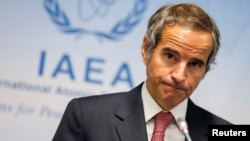
The head of the International Atomic Energy Agency (IAEA), Rafael Grossi, has arrived in Iran for high-level meetings. The visit comes amid discussions with Tehran on the origin of uranium particles enriched to up to 83.7 percent purity, very close to weapons-grade, at its Fordow enrichment plant, according to a report by the nuclear watchdog seen by Reuters. The head of Iran's Atomic Energy Organization, Mohammad Eslami, said earlier this week that the Islamic republic's production is at 60 percent, according to state media. Grossi was met at the airport by Eslami's deputy and his spokesman Behrouz Kamalvandi. To read the original story by Reuters, click here.
- By Reuters
UN Atomic Watchdog's Chief Will Travel To Iran Seeking Breakthrough On Cooperation
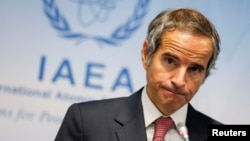
The UN nuclear watchdog says its chief, Rafael Grossi, will travel to Iran for "high-level meetings" as diplomats say he wants to jolt Tehran into cooperating with an investigation into uranium traces found at undeclared sites. Iran's stonewalling of the International Atomic Energy Agency's yearslong investigation into uranium traces found at three undeclared sites prompted the IAEA's 35-nation Board of Governors to pass a resolution in November ordering Iran to cooperate urgently with the probe. That cooperation has not materialized and Grossi is hoping that a meeting with Iranian President Ebrahim Raisi will help smooth the way toward ending the deadlock. To read the original story by Reuters, click here.
The Farda Briefing: Public Anger Rises As Iranian Currency Hits New Lows
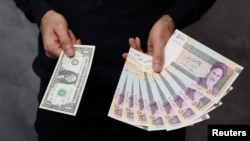
Welcome back to The Farda Briefing, an RFE/RL newsletter that tracks the key issues in Iran and explains why they matter. To subscribe, click here.
I'm RFE/RL correspondent Golnaz Esfandiari. Here's what I've been following during the past week and what I'm watching for in the days ahead.
The Big Issue
Iran's national currency, the rial, plummeted to new record lows on the country's unregulated market over the weekend, trading for 601,500 to the dollar, its lowest-ever rate. On February 28, the rial stood at 569,000 against the U.S. dollar, according to the foreign-exchange site Bonbast.com.
Iranian authorities have blamed the currency's fall on alleged attempts by the country's enemies to destabilize the Islamic republic amid several months of antiestablishment protests sparked by the September death in police custody of 22-year-old Mahsa Amini.
"After the enemy failed in its plans in the streets...it naturally heightened its pressure on the economy," government spokesman Ali Bahadori Jahromi told journalists on February 28, adding that some people allegedly behind the fall of the national currency inside the country had been arrested.
Why It Matters: The fall of the national currency, which has lost about 50 percent of its value since the beginning of the nationwide antiestablishment protests, comes amid Iran's international isolation over its brutal crackdown against demonstrators, controversial nuclear activities, and Tehran's deepening military ties with Russia, including the transfer of combat and suicide drones to boost Moscow's unprovoked war against Ukraine.
What's Next: The fall of the national currency has led to public anger among Iranians, who are already struggling to make ends meet amid soaring food prices. In recent days, many have attempted to purchase dollars at exchange offices to protect their savings, while steelworkers, firefighters, bakers, and retirees in Tehran and other cities have openly complained about rising inflation and skyrocketing prices. The deteriorating economic situation could lead to more protests, adding pressure on the establishment.
Stories You Might Have Missed
- Health Minister Bahram Eynollahi said on February 28 that "a mild poison" was the cause of the mass illnesses of schoolgirls in Iran. Eynollahi was quoted by state media as saying that determining the origin of the unnamed poison was not within the scope of his ministry. His comments came amid increased public concern over a wave of sickness that has struck some 30 girls' schools in the religious city of Qom since late November. Authorities have suggested that the incidents could be intentional, fueling allegations that religious extremists or anti-regime groups could be responsible.
- Iranians are mourning the death of Pirouz, a 10-month-old Asiatic cheetah cub born in captivity in Iran, and many are blaming authorities for failing to save him. Pirouz ,who died of kidney failure this week in a veterinary hospital in Tehran, had become a symbol of national pride and hope for the millions of Iranians who closely followed updates about his progress and shared images of him online. Two of the cub's littermates died within days of their birth in late April, but Pirouz, which means "victorious," had survived and given hope for a critically endangered species. Pirouz and growing concerns about the survival of Asiatic cheetahs in Iran were highlighted in the lyrics of Baraye, a Grammy-winning song written by Shervin Hajipour that became the anthem of the Iranian protest movement.
What We're Watching
Inspectors from the International Atomic Energy Agency (IAEA) have found uranium particles enriched up to 83.7 percent in Iran's underground Fordow nuclear site, a confidential report seen by Western news agencies said. "The report said that "discussions between the agency and Iran to clarify the matter are ongoing." The level of enriched uranium discovered is just short of the 90 percent needed for the production of nuclear weapons.
What's Next: The finding is likely to increase tensions over Iran's sensitive nuclear activities, which the country has expanded in past months. Tehran has maintained that it has not enriched uranium above 60 percent and that its nuclear program is for civilian purposes only, while acknowledging that "unintended fluctuations" during the enrichment process "may have occurred."
Kelsey Davenport, the director for nonproliferation policy at the U.S.-based Arms Control Association, said the discovery highlighted the need for additional monitoring of Iran's nuclear program. "Unlikely but not impossible that the 84 percent enriched particles were an accident. But by accident or intention, this incident underscores the critical need for additional monitoring & transparency," she said on Twitter.
The IAEA report follows comments by CIA chief William Burns, who said over the weekend that Iran's nuclear program had "advanced very far, to the point where it would only be a matter of weeks before they can enrich to 90 percent, if they chose to cross that line." Burns, however, added that Iranian Supreme Leader Ayatollah Ali Khamenei had apparently not made a decision on resuming the country's "weaponization program that we judge they suspended or stopped at the end of 2003."
That's all from me for now. Don't forget to send me any questions, comments, or tips that you have.
Until next time,
Golnaz Esfandiari
If you enjoyed this briefing and don't want to miss the next edition, subscribe here. It will be sent to your inbox every Wednesday.
- By AFP
Iran Says UN Nuclear Watchdog Chief To Visit In 'Coming Days'
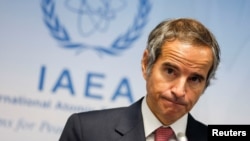
Iran says the head of the UN's nuclear watchdog agency, Rafael Grossi, will visit Tehran "in the coming days" amid a dispute over uranium enrichment levels in the Islamic republic. The Vienna-based International Atomic Energy Agency (IAEA) said earlier this month that it was in discussions with Tehran after Bloomberg News reported that the watchdog's inspectors in Iran had found uranium enriched to 84 percent purity. Iran denied the report. On February 27, the Atomic Energy Organization of Iran said Grossi would travel to Iran "in the coming days" following an official invitation from its director, Mohamamd Eslami. To read the original story by AFP, click here.
- By Reuters
IAEA Says In Discussions With Iran After Report Of Enrichment

The UN's nuclear watchdog said on February 19 that it was discussing the results of recent verification activities with Iran after Bloomberg News reported the agency had detected uranium enriched to 84 percent purity, which is close to weapons grade. "The IAEA is aware of recent media reports relating to uranium enrichment levels in Iran," the International Atomic Energy Agency said on Twitter. "The IAEA is discussing with Iran the results of recent Agency verification activities and will inform the IAEA Board of Governors as appropriate." To read the original story from Reuters, click here.
- By dpa
U.S., Gulf States Urge Iran To Resolve Issues Over Nuclear Program Through Diplomacy
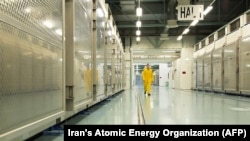
The United States and the Gulf Cooperation Council (GCC) have called on Iran to immediately cease its nuclear provocations, engage in meaningful diplomacy, and fully cooperate with the International Atomic Energy Agency's (IAEA) investigations into particles of nuclear material found at undeclared locations in the country. A joint statement on February 17 by the United States and GCC member states noted that as documented by the IAEA, Iran's production of highly enriched uranium had no credible civilian purpose and was seriously exacerbating regional and global tensions.
- By Reuters
France Urges Stronger International Response To Iran's Missile Program
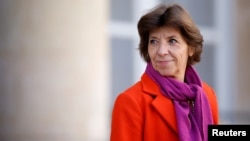
There must be a stronger "international response" to the threat posed by Iran's ballistic-missile program, French Foreign Minister Catherine Colonna told her U.S. counterpart, Antony Blinken, France's Foreign Ministry said on February 10. The ministry said Colonna and Blinken spoke by phone on February 10. The two also discussed the need for Iran to fully cooperate with the International Atomic Energy Agency, which said last week Tehran was inconsistent in meeting its nuclear obligations. During the call, Colonna and Blinken also reiterated their "full support" to Ukraine, the ministry said. To read the original story by Reuters, click here.
- By AFP
Iran Slams IAEA Chief After Centrifuge Report; U.S., Allies Criticize Tehran's Response

Iran slammed UN nuclear watchdog chief Rafael Grossi after the International Atomic Energy Agency (IAEA) raised concerns over covert changes to equipment at its Fordow uranium-enrichment plant, state media said on February 4. The IAEA said in a confidential report seen by AFP on February 1 that Iran had substantially modified an interconnection between two centrifuge clusters enriching uranium to up to 60 percent at thhe Fordow Fuel Enrichment Plant (FFEP), without giving prior notice. "We gave a letter to the agency that an inspector...made a mistake and gave an incorrect report," Iranian nuclear chief Mohamad Eslami was quoted as saying by IRNA. The United States issued a joint statement with France, the United Kingdom, and Germany on February 3 criticizing Iran's "inadequate" response to the report on its nuclear program.
- By AFP
After Netanyahu Talks, Macron Warns Of Iran Nuclear 'Consequences'
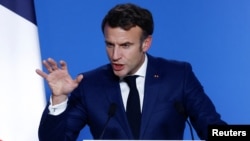
French President Emmanuel Macron denounced late on February 2 the "headlong rush" of Iran's nuclear program after talks with Israeli Prime Minister Benjamin Netanyahu, who was in Paris to seek a stronger European stance against Tehran. In a statement released after a dinner meeting in the Elysee Palace, Macron warned that Tehran continuing with the atomic project "would inevitably have consequences." Israel has long accused Iran of seeking a nuclear weapon, while Tehran insists its nuclear program is aimed solely at generating energy.
U.S. Envoy Says Tehran Missed 'Golden' Opportunity For Deal, Slams Iran For Drones, Protest Response
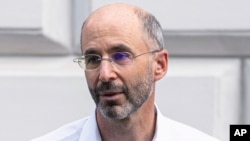
The Biden administration's envoy to Iran says a deal to revive a nuclear deal between Iran and world powers is not dead, but Washington is skeptical Tehran is "prepared or able" to reach an agreement after it backed away from "a golden opportunity" in September to finalize an accord and then threw its support behind Moscow in its war against Ukraine.
Robert Malley, the U.S. special envoy for Iran, told RFE/RL's Radio Farda in an interview on December 22 that the negotiations reached a point in September where "we even thought for a day or two that Iran was on board," until Tehran tacked on new demands at the last minute that scuppered the chances of moving forward.
Malley said that nationwide protests in Iran over the death of a young woman soon after she was arrested for allegedly wearing a head scarf improperly, along with Tehran's support for Russia in its war against Ukraine, have overtaken much of the diplomatic focus in Washington.
"They're the ones who killed the opportunity for a swift and immediate return to the JCPOA. Since then, things have happened. But nothing has happened that has changed our very strong skepticism that Iran is prepared or able to reach a nuclear deal," he said.
The accord, officially called the Joint Comprehensive Plan of Action (JCPOA), collapsed in 2018 when then-U.S. President Donald Trump pulled out of the deal and reimposed crippling sanctions that have battered Iran's economy and its currency.
After Washington withdrew, Iran -- which the United States has labeled a terrorist state -- began to breach some of the pact's nuclear limits saying they could no longer be enforced.
Despite a viral social-media video where U.S. President Joe Biden told an Iranian protester on the sidelines of an election rally in California on November 4 that the JCPOA "is dead, but we are not going to announce it," Iran's foreign minister and top nuclear negotiator met with the European Union's foreign policy chief and the bloc's official who is coordinating nuclear talks with Iran in Jordan on December 20.
No details of the meeting were released but the report raised hopes in some corners that there once again could be some movement toward a deal.
Malley also slammed Iran's leadership for selling hundreds of deadly kamikaze drones to Moscow, which invaded Ukraine in late February.
Moscow has used the aircraft to target civilian infrastructure in Ukraine, especially its energy installations in what some Western leaders have called the "weaponization" of Ukraine's harsh winter conditions to hurt civilians.
British Defense Secretary Ben Wallace said on December 20 that Russia intended to give Iran advanced military components in exchange for hundreds more drones. Tehran has said the drones were delivered to Russia before the invasion.
"No country is doing more today to help in Russia's losing, illegal war against Ukraine and that's something I think Iran should think long and hard about," Malley said.
The September 16 death of Mahsa Amini, which officials blamed on a heart attack, has touched off a wave of anti-government protests in cities across the country -- the biggest threat to the Islamic government since the 1979 revolution. The authorities have met the unrest with a harsh crackdown that rights groups say has killed more than 400 people, including 62 children.
Officials, who have blamed the West for the demonstrations, have vowed to crack down even harder on protesters, with the judiciary leading the way after the unrest entered a fourth month.
Malley applauded Iranians for rising up to demand their rights, saying their courage has "put a spotlight" on what is happening in Iran.
"We see the protests for what they are: which is a very profound, courageous expression by the Iranian people of a demand for respect for their fundamental rights," he said, adding the U.S. administration has been working with tech companies to try and help ensure the flow of communications in Iran amid the regime's attempts to hinder Internet access to help quell the unrest.
"The regime cannot hide what it has been doing to its people," Malley said.
Malley also said Washington continued to have "interaction" with Iranian officials as it tries to bring back U.S. citizens who are being "unjustly detained" in the Middle Eastern country.
He said that remains a priority for the Biden administration "regardless what is happening in our relationship with Iran."
According to The Washington Post, three Americans -- business executives Siamak Namazi and Emad Shargi and environmentalist Morad Tahbz -- are serving 10-year prison sentences in Iran on spying charges.
With additional contributions from RFE/RL's Radio Farda
U.S. Envoy: Nuclear Deal With Iran Is Not Dead
Robert Malley, the U.S. special envoy to Iran, told RFE/RL's Radio Farda in an interview on December 22 that the nuclear deal with Iran is not dead. The Biden administration's special envoy for Iran said that negotiations on reviving the deal reached a point in September where "we even thought for a day or two that Iran was on board" until Tehran tacked on new demands at the last minute that scuppered the chances of moving forward. Commenting on the ongoing protests in Iran, Malley said that they are "a very profound, courageous, expression by the Iranian people of a demand for respect for their fundamental rights."
Iranian Currency Weakens Further Amid Protests, Rumor That Nuclear Deal Is 'Dead'
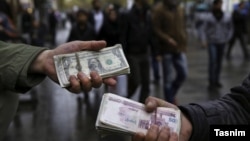
Iran's national currency, the rial, fell to a record low against the U.S. dollar as unrest triggered by the death in custody of a young woman over an alleged head scarf violation continues to rock the country.
The rial traded at 396,700 to the dollar on December 20, according to traders in Tehran and the Bonbast.com foreign-exchange website, down from the quoted price of 353,400 a month ago.
Before the beginning of the recent protests, which came after the death of 22-year-old Mahsa Amini on September 16, the rial was at 298,200 to the dollar.
The weakening of the currency has also intensified due to reports about the end of hopes for a revival of a 2015 nuclear accord between Tehran and global powers.
Iran's foreign minister and top nuclear negotiator met with the European Union's foreign policy chief and the bloc's official who is coordinating nuclear talks with Iran in Jordan on December 20, according to the official Iranian news agency IRNA. No further details of the meeting were released.
A video has gone viral on Iranian social networks in which U.S. President Joe Biden tells an Iranian protester on the sidelines of an election rally in California on November 4 that the Joint Comprehensive Plan of Action (JCPOA) agreement “is dead, but we are not going to announce it."
When the nuclear deal was signed with world powers, the rial was trading at 32,000 to the dollar. The agreement gave Tehran relief from financial sanctions in return for curbs on its nuclear program.
The accord collapsed in 2018 when then-U.S. President Donald Trump pulled out of the deal and reimposed crippling sanctions that have battered Iran's economy and its currency. After Washington withdrew, Iran began to breach some of the pact's nuclear limits saying they could no longer be enforced.
Tehran insists its nuclear program has only civilian purposes, but the West fears it could be moving closer to being able to construct nuclear weapons.
Written by Ardeshir Tayebi based on an original story in Persian by RFE/RL's Radio Farda
- By Reuters
Iranian, EU Nuclear Negotiators Reportedly Meet In Jordan
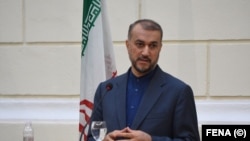
Iran's foreign minister and top nuclear negotiator met with the European Union's foreign policy chief and the bloc's official coordinating nuclear talks with Iran in Jordan on December 20, Iran's official IRNA news agency reported. Iran's Foreign Minister Hossein Amir-Abdollahian and nuclear negotiator Ali Bagheri Kani are said to have met EU foreign policy chief Josep Borrell and nuclear talks coordinator Enrique Mora ahead of a regional conference being hosted by Jordan. IRNA gave no further details about the meeting. To read the original story from Reuters, click here.
- By AFP
Iran Says Enriched Uranium Capacity Hits Record Level
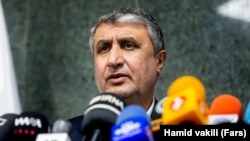
Iran said on December 17 that its uranium enrichment capacity has increased to record levels, a day before UN nuclear monitors are set to visit the country. "Currently, the enrichment capacity of the country has reached more than twice the entire history of this industry," Mohammad Eslami, head of the Atomic Energy Organization of Iran, said. The International Atomic Energy Agency said on December 14 that a technical team will visit Iran on December 18 to try to resolve a deadlock over the detection of traces of radioactive material at sites not declared as having hosted nuclear activities.
- By AP
Iranian Reportedly Begins Construction On Nuclear Plant
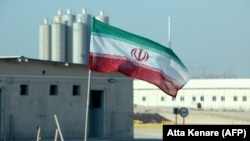
Iran has begun construction on a new nuclear power plant in the country's southwest, Iranian state TV announced, amid tensions with the United States over sweeping sanctions imposed after Washington pulled out of the Islamic republic's nuclear deal with world powers. The new 300-megawatt plant, known as Karoon, will take eight years to build and cost around $2 billion, the country’s state television and radio agency reported on December 3. The plant will be located in the oil-rich Khuzestan Province, near its western border with Iraq, it said. To read the original story from AP, click here.
- By Reuters
UN Nuclear Chief Says Iran Ties Need To Get Back On Track
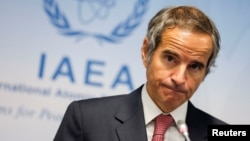
Iran appears to be at odds with the UN nuclear watchdog over information it should be providing regarding its atomic program, the head of the International Atomic Energy Agency said on December 2. "We don't seem to be seeing eye-to-eye with Iran over their obligations to the IAEA," Rafael Grossi told a conference in Rome, adding that he was concerned over a recent announcement by Tehran that it was boosting its enrichment capacity. "We need to put our relationship back on track," he said. Grossi said he was "still hopeful" Tehran would give an explanation for the unexpected discovery a few years back of traces of uranium at three undeclared sites. To read the original story from Reuters, click here.
Iran Says Fordow Nuclear Plant Now Enriching Uranium To 60 Percent

Iran has announced it is now enriching uranium at a 60 percent purity level at its Fordow underground nuclear facility after the United Nations nuclear watchdog condemned Tehran's failure to cooperate over visits by the agency.
The official state-run news agency IRNA reported on November 22 that the Fordow site, which is buried in the side of a mountain, was producing uranium with an enrichment level of 60 percent -- one technical step away from weapons-grade levels -- "for the first time."
Iran already produces uranium at 60 percent at two other plants.
IRNA did not say how much of the 60 percent-enriched uranium had been produced at Fordow.
The semiofficial Fars news agency reported that Iran has also begun to replace first-generation centrifuges (IR-1) with advanced IR-6 centrifuges at Fordow, which would allow it to escalate its enrichment activities further.
The IAEA later confirmed Iran's claim that it has started enriching uranium up to 60 percent at its Fordow plant. This is in addition to production that has taken place at Natanz, another uranium enrichment plant in Iran, since April 2021, the IAEA said. Iran continues to advance its enrichment activities there "and now plans to install a second production building," the IAEA said.
White House national-security spokesman John Kirby told a briefing on November 22 that the administration of President Joe Biden was "going to make sure we have all options available."
"We certainly have not changed our view that we will not allow Iran to achieve a nuclear weapons capability," he said.
Britain, France, and Germany also condemned Iran's nuclear advances.
"Iran’s step is a challenge to the global nonproliferation system," the three nations said in a joint statement. "This step, which carries significant proliferation-related risks, has no credible civilian justification."
The statement added that the three countries "will continue to consult, alongside international partners, on how best to address Iran’s continued nuclear escalation."
An International Atomic Energy Agency (IAEA) board of governors meeting last week in Vienna criticized Iran for failing to allow inspections of nuclear sites, while the UN agency's chief, Rafael Grossi, recently said he was "seriously concerned" over uncertainty surrounding Iran's nuclear program, which Tehran claims is purely for civilian purposes.
Exacerbating tensions, the IAEA has been waiting for an explanation from Tehran about the origin of undeclared uranium particles that were detected at three locations. The issue has been a key sticking point in wider talks between Iran and global powers seeking to revive a 2015 deal that curbs Tehran's nuclear program in exchange for relief from Western sanctions.
The United States unilaterally pulled out of the accord in 2018 and reimposed crippling sanctions that have battered Iran's economy and its currency. After Washington withdrew, Iran began to breach some of the pact's nuclear limits, saying they could no longer be enforced.
The deal capped enrichment at 3.67 percent.
With reporting by Reuters
- By Reuters
No Push For Iran Nuclear Talks, U.S. Envoy Says, Due To Protests, Drone Sales

Iran's crackdown on protesters and the sale of drones to Russia have turned Washington's focus away from reviving a nuclear deal, which Tehran has so far rejected, the U.S. special envoy for Iran said on November 14. Speaking to reporters in Paris, Robert Malley insisted that the United States would leave the door open to resume diplomacy "when and if" the time came, but for now Washington would continue a policy of sanctions and pressure. To read the original story from Reuters, click here.
- By Reuters
U.S., Western Europe Push IAEA Board To Say Iran Must Cooperate 'Urgently'
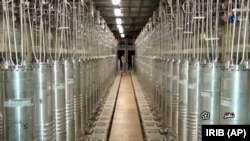
The United States, Britain, France, and Germany have prepared a draft resolution for a UN nuclear watchdog board meeting calling it "essential and urgent" for Iran to explain uranium traces found at three sites, the text seen by Reuters showed. "[The Board of Governors] decides it is essential and urgent...that Iran act to fulfill its legal obligations and...take the following actions without delay," said the text, dated November 11 and sent to International Atomic Energy Agency member states before next week's meeting of the 35-nation board, listing actions such as providing credible explanations for the traces. To read the original story from Reuters, click here.


